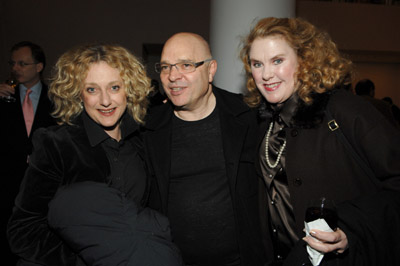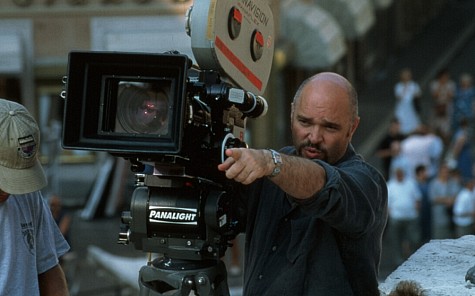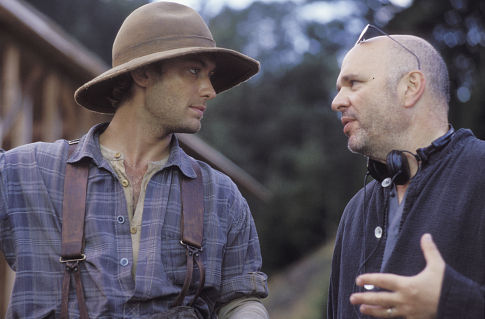
Anthony Minghella
Birthday: 6 January 1954, Ryde, Isle of Wight, England, UK
Height: 174 cm
Anthony Minghella was the son of immigrants from Italy, who own an ice-cream factory on the Isle of Wight, where Anthony was born on January 6, 1954. He and his two siblings, Edana Minghella and Domin ...Show More

I want to feel in film. I want to understand, and I want to see the parallels.
I want to feel in film. I want to understand, and I want to see the parallels.
I never feel more myself than when I'm writing; I never enjoy any day more than a good writing day.
I never feel more myself than when I'm writing; I never enjoy any day more than a good writing day.
[from his Oscar acceptance speech, 1997] It's my daughter's 18th birthday today - happy birthday Han Show more
[from his Oscar acceptance speech, 1997] It's my daughter's 18th birthday today - happy birthday Hannah! This is a great day for the Isle of Wight today. Hide
[on Truly Madly Deeply (1990)] For good or bad, that's the film that's mattered most to people. It's Show more
[on Truly Madly Deeply (1990)] For good or bad, that's the film that's mattered most to people. It's the film that oddly has spoken most directly to people that I meet. And it's sort of dispiriting in a way because it was a film that was painless to make, with my friends; I did very little work preparing the screenplay, it was a quick shoot, it was a painless edit, it was sort of done before I even realised it. People said to me, 'It was great the way you did this', but I can't claim the credit because at the time I didn't know how to do anything else and I only had 28 days to make it, and I've been struggling to reproduce the lack of complication that that film has ever since. It was a group of mates and a camera really. Hide
You can't elect your voice as a filmmaker. You might want to, you might want to design the kind of f Show more
You can't elect your voice as a filmmaker. You might want to, you might want to design the kind of filmmaker you could be. You might aspire to be a particular kind of filmmaker, but you can't elect it. Hide
Nobody wants to make any film, ever. I mean, you can assume that every head of every studio would be Show more
Nobody wants to make any film, ever. I mean, you can assume that every head of every studio would be perfectly happy never to make another film, because making films is dangerous, costs too much money, none of them make sense, there's absolutely no guarantee that they're going to work - the best thing is not to make any; you can't get fired for not making a film - you're going to get fired for making the wrong film. And so you realise that the first words anybody in the movies wants to say is no, and the job of the director or producer or writer is finding the area of least resistance to get the film made. There's never been any movie I've made that anybody's wanted to make, ever. Hide
I'm interested in stories which insist on a dog fails-to-eat-dog kind of world. I hate misanthropy a Show more
I'm interested in stories which insist on a dog fails-to-eat-dog kind of world. I hate misanthropy and want to believe that there's a possibility that we might all be redeemed, that hope deferred makes the soul sick, that our humanity is fragile, funny, common, crazy, full of the longing for love, the failure of love. I want to tell stories which require something of an audience, by way of thought, argument, emotion, because I'm more often in an audience than I am a maker of films, and that's the kind of movie I want to see. Hide
When I became the chair of the British Film Institute, I didn't understand how much of my time would Show more
When I became the chair of the British Film Institute, I didn't understand how much of my time would be taken up with trying to make a case for the British Film Institute: what it's for, why it exists, why it needs its money. Hide
[on The English Patient (1996)] Michael Ondaatje's novel has the deceptive appearance of being compl Show more
[on The English Patient (1996)] Michael Ondaatje's novel has the deceptive appearance of being completely cinematic. Brilliant images are scattered across its pages in a mosaic of fractured narratives, as if somebody had already seen a film and was in a hurry trying to remember it. In the course of a single page, the reader can be asked to consider events in Cairo, or Tuscany, or England's West Country during different periods, with different narrators; to meditate on the natures of winds, the mischief of an elbow, the intricacies of a bomb mechanism, the significance of a cave painting. The wise screen adapter approaches such pages with extreme caution. The fool rushes in. When I was writing the screenplay I thought, 'My God, what am I doing!' My friends told me the book was unadaptable. Fortunately, Michael Ondaatje was our greatest ally. He let me dismantle his novel, reimagine it and still had dinner with me and gave me good notes. I didn't do this to subvert what he'd done, but to me there was no obvious way I could make a conventional adaptation of his work. The process of adapting The English Patient required me to join the dots and make a figurative work from a pointillist and abstract one. Any number of versions were possible and I'm certain that the stories I chose to elaborate say as much about my own interests and reading as they do about the book. Hide
I had never thought of myself as a director and found out that I was not. I am a writer who was able Show more
I had never thought of myself as a director and found out that I was not. I am a writer who was able to direct the films that I write. Hide
The thing that is most notably different about working in the US is that if you are embraced then yo Show more
The thing that is most notably different about working in the US is that if you are embraced then you are completely accepted. It was quite giddy because you'd be there and Meryl Streep would come on the phone and you'd think it was your mother pretending to be Meryl Streep or maybe your sister, but it was really Meryl Streep. [2008] Hide
The only lesson to extract from any civil war is that it's pointless and futile and ugly, and that t Show more
The only lesson to extract from any civil war is that it's pointless and futile and ugly, and that there is nothing glamorous or heroic about it. There are heroes, but the causes are never heroic. Hide
[on The English Patient (1996)] I think the film is quite cruel actually and quite austere; it carri Show more
[on The English Patient (1996)] I think the film is quite cruel actually and quite austere; it carries this lava of emotion on quite a formal surface. And one of the reasons why in my life I have loved Bach so much is because I think he too has this combination of an extremely formal structure and apparent austere sound, but underneath there's this emotion boiling away, and I think that one of the purposes of fiction is to exercise the emotional muscle - that's what we go for, we go to think and to feel and I think that feeling somehow in England is at a premium, that people are embarrassed to feel in public, whereas I think that's the luxury of fiction - you can inhabit areas of existence which are not your own but which afford you the possibility of being able to go to places naked really, and I feel my own nakedness in the work that I'm doing; in fact I never watch anything I've been associated with after I've done it because I feel like I'm standing there for everybody to look at, so I haven't seen The English Patient since I finished it. [1997] Hide
Anthony Minghella's FILMOGRAPHY
All
as Actor (8)
as Director (5)
as Creator (5)










































